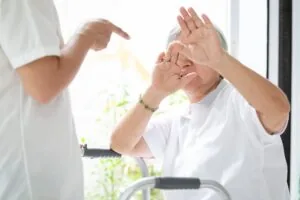How to Report a Crime Against the Elderly
Abuse and NeglectCrimes against the elderly can take various forms, ranging from financial harm to physical injuries. Unfortunately, these crimes frequently happen to nursing home residents.
If you believe that your loved one is the victim of a crime while residing at a nursing home, the first step is to report the incident. You should also consult with an experienced nursing home abuse and neglect attorney since the nursing home may share in some or all of the responsibility.
A knowledgeable nursing home injury attorney can pursue compensation on behalf of your loved one, answer all of your questions, and represent you during any legal proceedings throughout the case.
Common Types of Crimes Against the Elderly in Nursing Homes

Crimes against the elderly in nursing homes are an unfortunate reality, often involving various forms of abuse and exploitation. The following are some types of crimes frequently committed in nursing homes:
- Physical Abuse — This involves the use of force that may result in bodily injury, pain, or impairment. Physical abuse in nursing homes can include hitting, pushing, restraining, or improperly medicating residents.
- Neglect — Neglect occurs when caregivers fail to provide adequate care and attention to the needs of elderly residents. This may involve withholding food, water, medication, or necessary medical attention, leading to physical and emotional suffering.
- Financial Exploitation — Financial exploitation involves the unauthorized use of an elderly person’s funds or assets for the benefit of another person. Caregivers or staff members may coerce or manipulate residents into giving them money, signing over property, or accessing their financial accounts.
- Emotional Abuse — Emotional abuse can take many forms, including verbal harassment, intimidation, humiliation, or isolation. Caregivers may belittle, threaten, or manipulate elderly residents, causing them psychological distress and undermining their sense of dignity and self-worth.
- Sexual Abuse — Sexual abuse involves any non-consensual sexual activity or contact with an elderly person. This form of abuse is particularly heinous and can lead to physical injury, emotional trauma, and a profound sense of violation.
- Medication Mismanagement — Improper administration or overmedication of prescription drugs can constitute a form of abuse in nursing homes. Caregivers may neglect to administer medications as prescribed, give the wrong dosage, or use medications as a means of control or restraint.
- Healthcare Fraud — Some nursing home staff members may engage in healthcare fraud by billing for services not provided, overcharging for medical supplies, or submitting false insurance claims. This defrauds the healthcare system and compromises the quality of care elderly residents receive.
- Identity Theft — Elderly residents may be particularly vulnerable to identity theft, especially if caregivers have access to their personal information. Identity theft can result in financial loss, damage to credit, and emotional distress for the victim.
Injuries and Harms That Elderly Individuals Can Face in Nursing Homes
Criminal activity in nursing homes can lead to a range of injuries and harms for elderly individuals, affecting their physical health, emotional well-being, and overall quality of life. Some specific injuries and harms that elderly individuals can face due to criminal activity in nursing homes include:
- Physical Injuries — Physical abuse or neglect can result in a variety of injuries, including bruises, cuts, fractures, and head trauma. These injuries can cause pain, discomfort, and functional impairment, making it difficult for elderly residents to carry out daily activities and maintain independence.
- Emotional Trauma — Elderly individuals who experience abuse or exploitation may suffer from emotional trauma, including anxiety, depression, and post-traumatic stress disorder (PTSD). The psychological effect of criminal activity in nursing homes can be profound, leading to feelings of fear, shame, and helplessness.
- Loss of Trust — Victims of abuse or exploitation may lose trust in caregivers, staff members, and the nursing home environment as a whole. This loss of trust can erode the sense of safety and security that elderly individuals rely on for their well-being, leading to increased vulnerability and isolation.
- Financial Loss — Financial exploitation can result in significant financial losses for elderly residents, jeopardizing their ability to afford necessary medical care, housing, and other essential expenses. Victims may also experience feelings of betrayal and shame as a result of being deceived or manipulated for financial gain.
- Medical Complications — Neglect or improper medical care can worsen existing health conditions and lead to new medical complications. Untreated injuries, infections, and chronic illnesses can escalate quickly in elderly individuals, increasing the risk of hospitalization, disability, and even death.
- Social Isolation — Victims of abuse or exploitation may withdraw from social interactions and activities, leading to social isolation and loneliness. Social isolation can have detrimental effects on mental and physical health, contributing to depression, cognitive decline, and a decline in overall quality of life.
- Loss of Dignity and Autonomy — Criminal activity in nursing homes can strip elderly individuals of their dignity, autonomy, and sense of self-worth. Victims may feel powerless and dehumanized, leading to a loss of confidence and self-esteem.
Reporting Crimes Against Elderly Individuals
Reporting a crime against an elderly loved one at a nursing home is essential to ensure their safety and well-being:
- Document the Incident — If you suspect that your elderly loved one has been a victim of a crime in a nursing home, document any evidence you have. This may include photographs of injuries, written statements from witnesses, or any relevant documents or records.
- Contact Authorities — Report the crime to the appropriate authorities, such as local law enforcement or adult protective services. Provide them with as much information as possible, including the nursing home’s name, the alleged perpetrator’s name, and details about the incident.
- File a Complaint with the Nursing Home — Inform the administration about the crime and file a formal complaint. Request a copy of the facility’s grievance policy and follow the necessary procedures for reporting incidents of abuse or neglect.
- Seek Legal Advice—Consider seeking legal advice from an attorney experienced in elder law or nursing home abuse. They can explain your rights, explore legal options, and pursue justice for your elderly loved one.
- Cooperate with Authorities — Cooperate fully with law enforcement and adult protective services during their investigation of the crime. Provide them with any additional information or evidence they may need to ensure a thorough and timely investigation.
- Advocate for Your Loved One — Be an advocate for your elderly loved one throughout the reporting and investigation process. Ensure that their needs and concerns are addressed and they receive the necessary support and services to recover from the crime.
- Follow Up Regularly — Follow up regularly with the authorities and the nursing home to monitor the progress of the investigation and ensure that authorities are taking appropriate action to address the crime. Stay informed about any developments or updates in the case.
- Seek Support—During this difficult time, seek support for yourself and your elderly loved one. Consider joining a support group for families of nursing home residents or seeking counseling to help cope with the emotional effects of the crime.
By taking prompt and decisive action to report a crime against an elderly loved one at a nursing home, you can help protect them from further harm and hold those responsible accountable for their actions.
Can the Nursing Home Be Negligent for Crimes Committed Against the Elderly There?

Nursing homes can be liable for negligence for crimes committed against elderly residents under their care. Proving negligence in such cases involves demonstrating that the nursing home failed to uphold its duty of care to protect residents from harm and includes the following steps:
- Duty of Care — The first step in proving negligence is establishing that the nursing home had a duty to provide its residents a safe and secure environment, including protection from criminal acts. This duty is implied in the contractual relationship between the nursing home and its residents.
- Breach of Duty—The next step is to demonstrate that the nursing home breached its duty of care by failing to take reasonable measures to prevent crimes against elderly residents. This may involve inadequate staffing levels, insufficient security measures, or failure to screen and supervise employees properly.
- Causation — The individual filing the claim (plaintiff) must show that the nursing home’s breach of duty directly caused or contributed to the crimes committed against the elderly resident. This requires establishing a clear connection between the negligent actions of the nursing home and the harm the resident suffered.
- Damages — Finally, the plaintiff must prove that the elderly resident suffered actual harm or damages due to the nursing home’s negligence. This may include physical injuries, emotional trauma, financial losses, or other forms of harm.
Important evidence in these cases may include:
- Medical Records — Medical records documenting any injuries the elderly resident sustained due to the crime can serve as crucial evidence of negligence.
- Witness Testimony — Testimony from witnesses, including staff members, other residents, or visitors, can provide valuable insight into the circumstances surrounding the crime and the nursing home’s response.
- Surveillance Footage — If available, surveillance footage from security cameras within the nursing home can provide visual evidence of the crime and any negligence on the part of the facility.
- Incident Reports — Incident reports the nursing home has filed documenting the crime and its aftermath can provide important details about the incident and the nursing home’s response.
- Staffing Records — Records detailing staffing levels and employee schedules can help establish whether the nursing home was adequately staffed to prevent and respond to criminal activity.
By gathering and presenting compelling evidence of negligence, victims of crimes committed against elderly residents in nursing homes can seek justice and hold the responsible parties accountable for their actions.
Recovering Financial Compensation in Nursing Home Negligence Cases

In nursing home negligence cases involving crimes against the elderly, victims and their families may seek financial compensation to cover their damages. Recovering financial compensation in these cases can help address medical expenses, emotional distress, and other losses incurred due to the nursing home’s negligence. The victim can pursue compensation for the following:
- Medical Expenses — Victims of nursing home negligence may incur significant medical expenses due to injuries sustained in the crime. Financial compensation can cover the cost of medical treatment, rehabilitation, and any ongoing care needed to address physical injuries and emotional trauma.
- Pain and Suffering — Victims of nursing home negligence may be entitled to compensation for pain and suffering from the crime. These non-economic damages can include physical pain, emotional distress, and loss of enjoyment of life the victim and their family members experienced.
- Loss of Consortium — Family members of elderly victims may be entitled to compensation for loss of consortium, which refers to the loss of companionship, love, and support resulting from the victim’s injuries or wrongful death. This compensation acknowledges the emotional toll family members suffered as a result of the nursing home’s negligence.
- Punitive Damages — In cases involving particularly egregious conduct or intentional wrongdoing, victims may pursue punitive damages in addition to compensatory damages. Punitive damages seek to punish the accused (defendant) and deter similar misconduct in the future.
To pursue financial compensation in nursing home negligence cases involving crimes against the elderly, victims and their families may consider taking the following steps:
- Consultation with an Attorney — Seek legal advice from an attorney with experience in nursing home negligence and elder abuse cases. An attorney can assess the circumstances of the case, explain your legal rights, and guide you through the process of seeking compensation.
- Gathering Evidence — Collect and preserve evidence related to the crime and the nursing home’s negligence, including medical records, incident reports, witness statements, and any other relevant documentation.
- Negotiation and Litigation — Work with your attorney to negotiate a settlement with the nursing home or pursue litigation in the court system if the parties cannot reach a fair settlement. Your attorney can advocate on your behalf and fight for the compensation you deserve.
By pursuing financial compensation in nursing home negligence cases, victims and their families can hold negligent parties accountable for their actions and secure the resources necessary to recover from the harm they have suffered.
Speak with a Nursing Home Negligence Lawyer Right Away
If you believe your loved one is the victim of a crime while residing in a nursing home, you need to take legal action right away. An experienced personal injury lawyer can help you report your suspicions and seek compensation on behalf of your loved one. An attorney can also represent your loved one during various legal proceedings and pursue the best possible result.
Nathan Hughey, an attorney and fourth-generation South Carolinian, founded Hughey Law Firm in 2007. Before that, he spent five years defending nursing homes and insurance companies. Leveraging his experience, he now advocates for those injured or wronged by such entities, securing over $220 million in verdicts and settlements.
